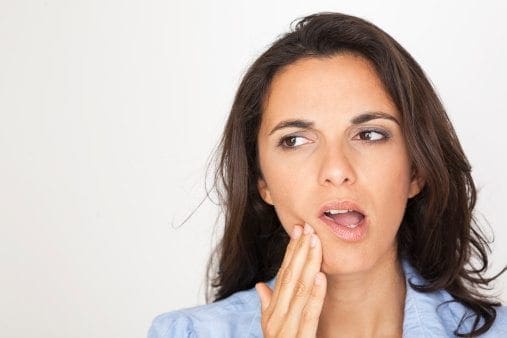Your body is a system that has various interconnected pieces–much like a puzzle. Sometimes, an issue in one part of the body can cause problems in another. Your oral health is a complex puzzle as well.
Even pieces that don’t seem connected can help you understand more about your health. Two of these important components include dental erosion and your jaw health.
Dental Erosion: The Silent Threat to Your Smile
Dental erosion is the gradual wear and tear of your tooth enamel. One way that your enamel can erode is through acid exposure. This acid can come from various sources. This may include acidic foods, beverages, and even stomach acid in cases of acid reflux. As the enamel erodes, your teeth become more vulnerable to sensitivity, cavities, and other dental issues.

What’s Behind TMJ Issues?
The temporomandibular joint (TMJ) is the hinge that connects your jaw to your skull. It’s responsible for the smooth movements of your jaw. This joint allows you to talk, chew, and yawn. TMJ issues can arise from factors like stress, jaw misalignment, or teeth grinding.
Many patients with TMJ issues can experience pain and chronic headaches. Over time, it can also affect your ability to open and close your mouth. But, how does dental erosion connect to TMJ issues?
The Hidden Connection: Dental Erosion’s Impact on TMJ
Surprisingly, dental erosion and TMJ issues are connected. As your enamel erodes, it can change the shape of your teeth. Over time, this can alter how your teeth come together. The ridges and valleys of your teeth should fit together perfectly.
A change in how your teeth come together can put extra strain on your jaw joint. This is because it will affect the alignment of your jaw. This can also be a factor in developing TMJ issues or worsening your current symptoms.
Bridging the Gap: How to Protect Your Oral Health
Taking care of your teeth is vital to prevent dental erosion and TMJ from wreaking havoc on your oral health.
One way you can reduce your chances of dental erosion is to look at your diet. You can limit how much acid you consume in your foods and drinks. For example, citrus foods, soda, and vinegar-based dressings contain high amounts of acid. When you do indulge, rinsing your mouth with water afterward can neutralize the acids.
Your oral hygiene routine can help defend your teeth from erosion. When your brush your teeth, use a fluoride toothpaste and a soft-bristle toothbrush. This helps protect your teeth from erosion and decay.
Another common trigger for teeth grinding and TMJ is stress. When stressed, many patients clench their jaws or grind their teeth. This can cause TMJ and dental erosion. Stress-reduction techniques like deep breathing, yoga, or meditation can also keep stress at bay.
If you grind your teeth, consider also wearing a custom mouthguard at night to prevent excessive wear and tear that can worsen TMJ symptoms.
How Acid Reflux Wears Down Teeth and Strains Your Jaw
Many people don’t realize that frequent heartburn or acid reflux can damage their teeth and jaw. Stomach acid that comes up into your mouth can slowly dissolve tooth enamel, especially on the back teeth.
As these teeth wear down unevenly, your bite changes. This forces your jaw to work harder to chew properly, putting extra stress on the TMJ. If you have frequent heartburn, talk to your doctor about treatment options to protect both your digestive health and your smile.
The Domino Effect of Tooth Wear
When even one tooth wears down from erosion, it can start a chain reaction throughout your mouth. Like a car with uneven tires, your jaw tries to compensate for the changed bite by adjusting its movement. Over time, this abnormal movement can lead to muscle fatigue, joint pain, and headaches.
Regular dental checkups can catch early signs of uneven wear before they turn into bigger problems. Sometimes simple treatments like bite adjustment or a protective dental guard can stop this domino effect.
Why Morning Jaw Pain Might Mean Nighttime Grinding
If you wake up with a sore jaw or headaches, you might be grinding your teeth at night without knowing it. This habit, called bruxism, wears down tooth surfaces and puts tremendous pressure on your TMJ. The more your teeth erode from grinding, the worse the jaw problems can become.
A custom night guard from your dentist does double duty. It protects your enamel from further damage while cushioning your jaw joint from the forces of grinding.
How Proper Nutrition Supports Jaw and Tooth Health
What you eat affects both your tooth enamel and jaw joint health. Calcium-rich foods like dairy and leafy greens keep teeth strong against erosion. Magnesium from nuts and whole grains helps relax jaw muscles. Crunchy fruits and vegetables give your jaw a healthy workout while stimulating saliva that protects teeth from acid.
Staying hydrated keeps joints lubricated and helps wash away acids. A balanced diet gives your body the building blocks it needs to maintain both strong teeth and a comfortable jaw.
Did we answer all your burning questions about dental erosion? Schedule a dental exam online or give Dr. Sara Chen a call at (972) 382-6855 to schedule a dental visit at Aesthetic Dentistry Centre.
